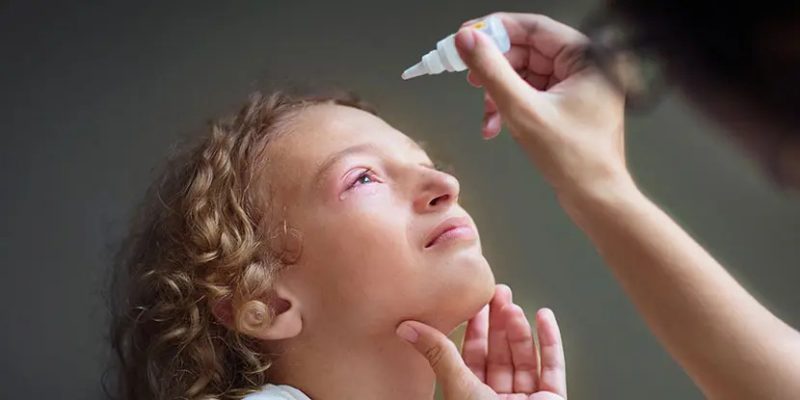When Do You Need Antibiotics for Pink Eye (Conjunctivitis)?
By Reena Mukamal for The American Academy of Ophthalmology Published Aug. 26, 2024
Most people diagnosed with pink eye are written a prescription for antibiotic eye drops or ointment, even though antibiotics usually don’t help pink eye go away faster.
A new study suggests children with pink eye who use antibiotics aren’t any better off than those who don’t. In fact, unnecessary use of antibiotics for pink eye can actually be harmful, according to experts.
When pink eye is caused by a virus, antibiotics won’t help
Pink eye (also known as conjunctivitis) is a common eye condition that can occur at any age and is usually caused by one of three things: a viral infection, a bacterial infection or exposure to an allergen. It can make the eyes red, itchy and teary and create a watery or goopy discharge and swollen, crusty eyelids.
“Eighty percent of
the time, pink eye symptoms come from a virus and, just as with a cold,
antibiotics do not kill viruses,” said ophthalmologist Rupa Wong, MD, a
spokesperson for the American Academy of Ophthalmology. Viral pink eye
usually resolves on its own within 7 to 14 days.
“Further, most
cases of bacterial pink eye also get better in about one to two weeks
without any treatment,” she added. If pink eye is triggered by an allergic reaction to something like pollen, dust mites, pets, contact lenses,
or cosmetics, it will improve by avoiding the things that are causing
the allergy and by using allergy eye drops or systemic anti-histamines —
not by antibiotics.
Antibiotics may not improve pink eye outcomes
Recent findings support the idea that antibiotics may not help pink eye go away any faster than it would on its own. The new study
examined a nationwide database of insurance claims from 2021. Nearly
45,000 children were treated for pink eye at a doctor’s office,
emergency room or eye clinic, and 69% were prescribed antibiotics.
Doctor’s offices gave antibiotics the most, to 72% of patients, compared
to ERs at 57% and eye clinics at 34%. Whether patients were prescribed
antibiotics or not, return visits to the doctor for pink eye were rare —
under 4% — according to the study.
This tells us that patients
are not at higher risk of complications or serious problems if they
don’t get an antibiotic prescription, said Dr. Wong.
“Ophthalmologists examine patients at a slit lamp to help distinguish between viral, bacterial and allergic pink eye,” said Dr. Wong. Antibiotics are only useful for some bacterial infections. If the pink eye is chronic and doesn’t resolve within a few weeks, ophthalmologists may order a lab culture to identify the root cause. This involves swabbing some discharge out of the corner of the eye and analyzing it under a microscope, said Dr. Wong.
Antibiotic use for pink eye can have downsides
While a course of topical antibiotics may seem like no big deal, unnecessary treatment can increase the resistance of bacteria to antibiotics and make it harder to treat true bacterial pink eye, said Dr. Wong.
Though most antibiotic eye drops don’t cause any kind of long-term damage, they can cause itching, stinging, burning, swelling, and redness. They can also cause more discharge. And they can trigger allergic reactions in some people.
“A lot of antibiotic drops have preservatives which can cause keratopathy or issues with the cornea,” said Dr. Wong. Keratopathy is more common in adults, but may cause issues with the cornea even in kids.
“The biggest problem with eye drops is that kids hate them and so if they’re unnecessary, then why bother?” said Dr. Wong.
How to treat pink eye without antibiotics
The vast majority of pink eye cases are viral and improve on their own. Because viral pink eye is highly contagious, strict hand hygiene will help protect others and safeguard the person with pink eye from reinfecting themself. This includes frequent hand washing, wiping down door handles and other shared surfaces, washing towels and bed sheets in hot water and avoiding direct contact with the infected eye. Children should stay home from school until their symptoms start to improve.
Placing over-the-counter lubricating eye drops in the refrigerator prior to administration and applying cold compresses can make the eyes feel more comfortable while they are healing from pink eye. Anti-allergy eye drops with antihistamines can lessen symptoms of allergic pink eye.
When are antibiotics are necessary for pink eye?
Doctors will appropriately prescribe antibiotics
- If pink eye is not getting better after 14 days
- If the patient is a baby younger than one month old
If antibiotic eye drops are dispensed, then be sure to finish the full course of the medicine.

